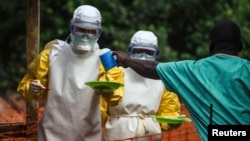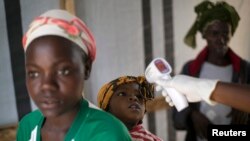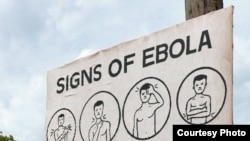After killing more than 11,000 people, West Africa's Ebola outbreak is down to a handful of cases. They are all in Guinea, where the disease first emerged nearly two years ago and where health workers battle community resistance in their bid to extinguish the disease.
New cases that cropped up in the Forecariah district “have taken us all by surprise,” said Guinea's Minister of Health Col. Remy Lama, adding that the district had been free of the disease for nearly 40 days.
Guinea’s battle against Ebola is hampered by residents who have abandoned preventive measures that help halt the spread of the virus, said Guinea task force spokesman Fode Tass Sylla. People shake hands, don’t wash hands and consult traditional healers instead of medics, said Sylla.
In the tiny village of Tanah, about 160 kilometers (99 miles) southeast of Conakry, health workers mingle with residents, the majority of whom are being tracked to see if they show Ebola symptoms after an ill woman came here in September to see a traditional healer.
Both she and the healer died, said Sylla. Six Ebola cases remain and more than 60 people are being monitored for symptoms. The World Health Organization recorded seven cases in Guinea in the past 21 days, according to the Nov. 4 situation report.
Though Guinea has seen the least cases and deaths among its neighbors, with just over 2,500 dead from about 3,800 cases, according to the World Health Organization, the deadly virus hangs on as residents resist warnings and safer practices.
Mounir Soumah, a 42-year-old teacher, said Guinea will continue to face problems unless people change their habits.
“It's important for our survival in Forecariah because we always have baptisms, marriages and Quran lectures,” he said. “It's in these ceremonies that people are contaminated.”






